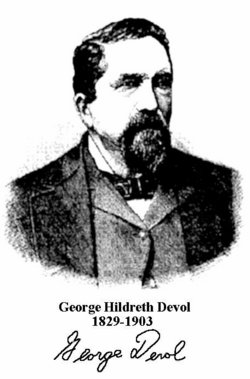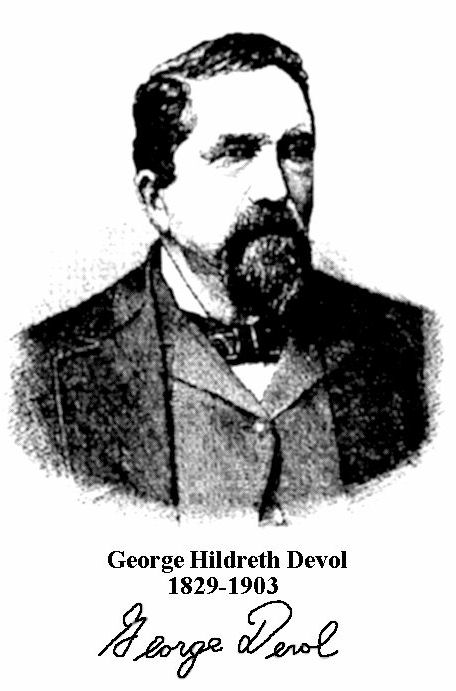He ran away from home at the age of 10 to become a cabin boy at $4.00 per month.
George H. Devol was, by his own admission, "the slickest rascal on the Mississippi River." A sure-thing gambler, Devol spent forty raucous years on the riverboats, cheating, conning, dealing cold hands, switching and stealing cards and fleecing suckers of an estimated quarter of a million dollars at the original sucker game,
three-card monte.
He reckoned he did his hometown, Marietta, Ohio, a genuine favor when, at ten, he ran away to be a cabin boy on the steamship Wacousta. "I was the worst boy west of the Alleghenies, and the townsfolk gave me twenty years, at best, to wind up on the gallows."
He was the prototypical riverboat gambler, proud of his craft,especially the various dishonest ways he could beat a sucker without the poor fellow catching on. In 1878, the aging flimflam man published his memoirs (he was 57). Entitled Forty Years a Gambler on the Mississippi, Devol's testament began with a flourish: "I was a cabin boy at ten in 1838; could steal cards and cheat the boys at eleven; stack the deck at fourteen; won hundreds of thousands from paymasters, fought more rough-and-tumble fights than any man in America, and was the most daring gambler in the world. "
Devol was a powerful man with a bull neck and a concrete cranium who excelled in the primitive dockside pastime of butting. He felled men for bets as high as
$1000, using "my good ole head." He either aimed at the solar plexus to render the opponent breathless or smote
him head-on between the eyes to leave him stupefied. A circus giant billed as "the Thickest Skull on Earth" fell like a sequoia when Devol butted him once. He laid out the stevedore champion of New Orleans in like fashion. When the big dockwalloper regained consciousness, he said, "When Devol run head-on up my nose, I thought it was a cannonball."
Good old Devol was king of the card sharks as well: cold-blooded, sharp-witted, not to mention nimble fingered. Most successful professionals like Devol were connivers, adept at palming cards and dealing from the bottom. They regularly used marked cards and employed "cappers" as shills, or "readers," adjutants who read opposing hands and signaled. Very few professional gamblers were squares, George Devol claimed: squares were honest, "the very best
way to lose. "
When the Civil War broke out, Devol and other riverboat gamblers formed a military unit in New Orleans called Wilson's Rangers. "A finer mounted troop of cavalry can hardly be found in the South," wrote the newspaper True Delta. Devol told a different story in his memoirs. Every morning, he said, the Rangers galloped conspicuously
through the city's street, scarves fluttering, feathered hats tipped at rakish angles. The ladies were greatly impressed. Once outside town, the Rangers scouted out some shade trees, dismounted, and spent the day studying their "books" on tactics.
"We would remain in the shade till the cool of the evening," Devol recounted, "then mount up and ride back into town again. The people would cheer and wave handkerchiefs and give us bouquets ... for
drilling all day in the hot sun, preparing to protect them from the damn Yankees."
Then one day in April 1862, Wilson's Rangers were called into action. Admiral Farragut's fleet was bombarding the forts below New Orleans. Out galloped the gallant Rangers to the cheers of the locals.
Six miles downstream, Yankee ships greeted them with a salvo of canister-shot. The heroic Gamblers' Brigade wheeled and returned, full gallop.
"We dismounted without orders," Devol recalled, "cut the buttons off our coats, buried our sabers, and blended into the citizenry as quickly as possible."
It was said of the "slickest rascal on the River" that you never knew when George Devol was kidding or being serious-and that's what made him the "slickest." Fittingly, no one knows how he cashed in his chips. Some say he was pushed off a steamboat and drowned. One thing is fairly certain. He went through more than two million dollars and
never saved a cent.
He wrote his own epitaph; "My ole head is hard and thick. Maybe this is why I never had enough sense to save my money. "
He ran away from home at the age of 10 to become a cabin boy at $4.00 per month.
George H. Devol was, by his own admission, "the slickest rascal on the Mississippi River." A sure-thing gambler, Devol spent forty raucous years on the riverboats, cheating, conning, dealing cold hands, switching and stealing cards and fleecing suckers of an estimated quarter of a million dollars at the original sucker game,
three-card monte.
He reckoned he did his hometown, Marietta, Ohio, a genuine favor when, at ten, he ran away to be a cabin boy on the steamship Wacousta. "I was the worst boy west of the Alleghenies, and the townsfolk gave me twenty years, at best, to wind up on the gallows."
He was the prototypical riverboat gambler, proud of his craft,especially the various dishonest ways he could beat a sucker without the poor fellow catching on. In 1878, the aging flimflam man published his memoirs (he was 57). Entitled Forty Years a Gambler on the Mississippi, Devol's testament began with a flourish: "I was a cabin boy at ten in 1838; could steal cards and cheat the boys at eleven; stack the deck at fourteen; won hundreds of thousands from paymasters, fought more rough-and-tumble fights than any man in America, and was the most daring gambler in the world. "
Devol was a powerful man with a bull neck and a concrete cranium who excelled in the primitive dockside pastime of butting. He felled men for bets as high as
$1000, using "my good ole head." He either aimed at the solar plexus to render the opponent breathless or smote
him head-on between the eyes to leave him stupefied. A circus giant billed as "the Thickest Skull on Earth" fell like a sequoia when Devol butted him once. He laid out the stevedore champion of New Orleans in like fashion. When the big dockwalloper regained consciousness, he said, "When Devol run head-on up my nose, I thought it was a cannonball."
Good old Devol was king of the card sharks as well: cold-blooded, sharp-witted, not to mention nimble fingered. Most successful professionals like Devol were connivers, adept at palming cards and dealing from the bottom. They regularly used marked cards and employed "cappers" as shills, or "readers," adjutants who read opposing hands and signaled. Very few professional gamblers were squares, George Devol claimed: squares were honest, "the very best
way to lose. "
When the Civil War broke out, Devol and other riverboat gamblers formed a military unit in New Orleans called Wilson's Rangers. "A finer mounted troop of cavalry can hardly be found in the South," wrote the newspaper True Delta. Devol told a different story in his memoirs. Every morning, he said, the Rangers galloped conspicuously
through the city's street, scarves fluttering, feathered hats tipped at rakish angles. The ladies were greatly impressed. Once outside town, the Rangers scouted out some shade trees, dismounted, and spent the day studying their "books" on tactics.
"We would remain in the shade till the cool of the evening," Devol recounted, "then mount up and ride back into town again. The people would cheer and wave handkerchiefs and give us bouquets ... for
drilling all day in the hot sun, preparing to protect them from the damn Yankees."
Then one day in April 1862, Wilson's Rangers were called into action. Admiral Farragut's fleet was bombarding the forts below New Orleans. Out galloped the gallant Rangers to the cheers of the locals.
Six miles downstream, Yankee ships greeted them with a salvo of canister-shot. The heroic Gamblers' Brigade wheeled and returned, full gallop.
"We dismounted without orders," Devol recalled, "cut the buttons off our coats, buried our sabers, and blended into the citizenry as quickly as possible."
It was said of the "slickest rascal on the River" that you never knew when George Devol was kidding or being serious-and that's what made him the "slickest." Fittingly, no one knows how he cashed in his chips. Some say he was pushed off a steamboat and drowned. One thing is fairly certain. He went through more than two million dollars and
never saved a cent.
He wrote his own epitaph; "My ole head is hard and thick. Maybe this is why I never had enough sense to save my money. "
Family Members
Sponsored by Ancestry
Advertisement
Records on Ancestry
Sponsored by Ancestry
Advertisement





